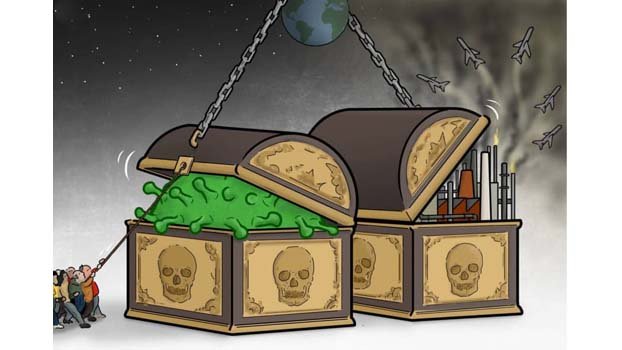Time to build the post-pandemic world order

The fight against COVID-19 is unlike a typical interstate conflict. The enemy is not a human or a state, but a virus. This ought to be a time for countries around the world to come together to confront a common enemy.
But that is not what is happening in the world. Antagonism between the United States and China is deepening to the point of becoming irreparable. The whole world has scrambled to procure ventilators and masks. With the global supply chain ruptured, states are placing medical products and other strategic resources and components under national control.
The United Nations Security Council is incapable of addressing the crisis and a politicized World Health Organization is losing its credibility. Meanwhile, the European Union has once again demonstrated that it cannot deal with crises effectively. With cyberspace awash with fake news and disinformation, Russia and China have launched their own forms of information warfare. We are witnessing the rapid collapse of the postwar liberal international order.
The new coronavirus represents a new battlefield in international politics that will determine the rise and fall of nations. It is also a contest to determine what type of state and what type of society will prove to be the most resilient.
The new coronavirus represents a new battlefield in
international politics that will determine the rise
and fall of nations. It is also a contest to determine
what type of state and what type of society will
prove to be the most resilient
Given the potential for a second and third wave of the pandemic, it is still too early to ascertain the outcome of this contest. Yet the virus is particularly vicious to the most vulnerable members of society. American and European societies have been weakened by disparities in wealth, education and health, growing social divisions, political polarization, and the forces of populism and xenophobia.
Meanwhile, Taiwan, South Korea, Vietnam, Australia, New Zealand and Hong Kong have skillfully fought back against COVID-19 by eliminating opportunities for the virus to enter and take hold. These governments have resolutely mobilized digital technologies to weather this crisis and demonstrated the resilience of their societies.
When it comes to the fight against the new coronavirus, existing categorizations of states — as developed or developing, democratic or autocratic, Western or non-Western — are of little use. The ultimate victors of the fight will be the states where casualties can be kept to a minimum while economic and social activity (particularly employment) is preserved to the maximum extent, and where citizens managed to sacrifice certain civil liberties in order to band together against the virus.
Failure to achieve these goals will inevitably damage the legitimacy of any type of political system or authority. The competition surrounding different political-economic systems will change from an export-competitiveness model, in which a country posits the universality of its own system (as has been the case with the foreign policy of promoting democracy abroad), to a model based on domestic-demand competitiveness, in which a country demonstrates how a model employed domestically produces strong performance.
This is not only a battle about now but also over what comes next.
The conversion to a contact-less economic and social system during the current pandemic has involved various initiatives in online medical care and education, teleworking, automated customer service, unmanned delivery systems and automated production lines. The key to such innovations has been society’s practical application of personal data. Societies that succeed in establishing a form of data governance supported by citizens will emerge as “developed states” in the age of dataism.
The principle of free trade, meanwhile, will be amended to address core concerns of national security and economic security. States must fuse trade strategy and industrial policy with investment and currency strategies, build effective public-private partnerships rooted in mutual trust, strengthen national power, wealth and resilience, and develop the political strategy and governance to sustain these achievements. The states that play a leading role in creating an international order for this new era in geoeconomics will emerge as victors.
At some point the COVID-19 crisis will end. But as was the case with the first and second world wars, the end of the crisis will not mark a return to “normal.” Rather, it will signal the advent of a “new normal.”
By the end of World War II, the Allied powers — especially the U.S. and Britain — already had a vision for the postwar international order. The Atlantic Charter was a blueprint for the postwar world order drafted jointly by U.S. President Franklin D. Roosevelt and British Prime Minister Winston Churchill in August 1941. In the midst of the war, and even before the onset of the Pacific War, these two leaders reconciled their respective geopolitical interests to envision the rules, norms and world order of the future “postwar” era.
The entire framework of the liberal international order originated in the Atlantic Charter, including the Bretton Woods system (the International Monetary Fund and GATT), NATO and the Japan-U.S. security alliance, the OECD and the Group of Seven.
According to Brookings Institution President John Allen, a retired U.S. general, “History will be written by the ‘victors’ of the COVID-19 crisis.” That is why it is now, at the very peak of the crisis, that Japan, together with like-minded countries, should draft a blueprint for the post-pandemic world order.
Yoichi Funabashi is chairman of the Asia Pacific Initiative and a former editor-in-chief of the Asahi Shimbun. This is a translation of his column in the monthly Bungei Shunju.



